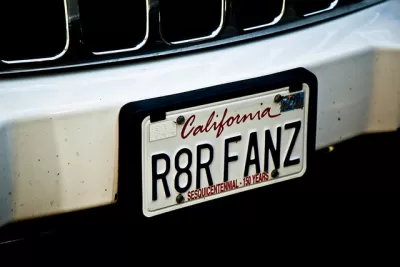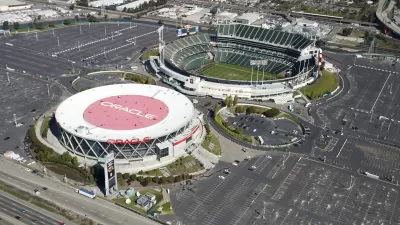Planetizen rounded up the pertinent news stories on the big move by the NFL's Raiders from their home in the East Bay to Sin City. The Las Vegas Raiders will be a thing by 2020 at the latest.

"As expected, NFL owners gave Las Vegas its blessing to host one of the league’s most storied franchises on Monday," reports Elliot Almond for The Mercury News, with proximity to the fan base that got the bad news on Monday.
Reporting for the Las Vegas Sun, Adam Candee made this pronouncement: "The Las Vegas Raiders are official."
Paul Gutierrez writes for ESPN about how the deal got made, with a 31-1 vote by NFL owners. The Miami Dolphins were the only team to vote against the move. Will Brinson and Tim Kawakami both report that Dallas Cowboy owner Jerry Jones was the not-so-invisible political and financial force behind the move.
The stadium deal that enables the move seemed dead in the water as recently as January 2017, when casino magnate Sheldon Adelson and Goldman Sachs backed out of the deal. Now, however, with a $1.9 billion stadium construction plan in place, Las Vegas is "poised to claim the mantle of World’s Most Expensive Stadium from East Rutherford, New Jersey, where the Jets and Giants play in the $1.6 billion MetLife Stadium," writes Henry Grabar for Slate. Here's the record breaking rub:
Clark County taxpayers will contribute $750 million to the new arena, a record for a sports facility—about $354 per resident, taken from an increased tax on hotel rooms. That tax currently pays for schools and transportation, in addition to tourism-related expenditures.
Back in October, Stanford economist Roger Noll went on the record in an article by Aaron Stanley calling the stadium deal "the worst deal for a city I have ever seen."
FULL STORY: BREAKING: NFL owners vote to send Raiders to Las Vegas

Planetizen Federal Action Tracker
A weekly monitor of how Trump’s orders and actions are impacting planners and planning in America.

Chicago’s Ghost Rails
Just beneath the surface of the modern city lie the remnants of its expansive early 20th-century streetcar system.

San Antonio and Austin are Fusing Into one Massive Megaregion
The region spanning the two central Texas cities is growing fast, posing challenges for local infrastructure and water supplies.

Since Zion's Shuttles Went Electric “The Smog is Gone”
Visitors to Zion National Park can enjoy the canyon via the nation’s first fully electric park shuttle system.

Trump Distributing DOT Safety Funds at 1/10 Rate of Biden
Funds for Safe Streets and other transportation safety and equity programs are being held up by administrative reviews and conflicts with the Trump administration’s priorities.

German Cities Subsidize Taxis for Women Amid Wave of Violence
Free or low-cost taxi rides can help women navigate cities more safely, but critics say the programs don't address the root causes of violence against women.
Urban Design for Planners 1: Software Tools
This six-course series explores essential urban design concepts using open source software and equips planners with the tools they need to participate fully in the urban design process.
Planning for Universal Design
Learn the tools for implementing Universal Design in planning regulations.
planning NEXT
Appalachian Highlands Housing Partners
Mpact (founded as Rail~Volution)
City of Camden Redevelopment Agency
City of Astoria
City of Portland
City of Laramie




























